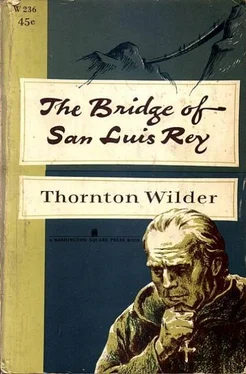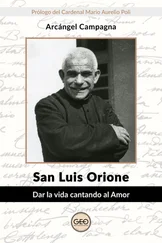It was impossible that anyone in the theatre could have missed the intention of the songs. Camila could only assume that the Marquesa, out of a sort of fantastic magnanimity, was playing the farce of not having noticed it. She was almost in tears: “But you are so good to overlook my childishness, Señora,—I mean Your Grace. I did not know. I did not know your goodness. Señora, permit me to kiss your hand.”
Doña María held out her hand astonished. She had not for a long time been addressed with such consideration. Her neighbors, her tradespeople, her servants—for even Pepita lived in awe of her,—her very daughter had never approached her thus. It induced a new mood in her; one that must very likely be called maudlin. She became loquacious:
“Offended, offended at you, my beautiful, . . . my gifted child? Who am I, a . . . an unwise and unloved old woman, to be offended at you? I felt, my daughter, as though I were—what says the poet?—surprising through a cloud the conversation of the angels. Your voice kept finding new wonders in our Moreto. When you said:
‘Don Juan, si mi amor estimas,
Y la fe segura es necia.
Enojarte mis temores
Es no querarme discreta.
¿Tan seguros. . . .’
and so on,—that was true! And what a gesture you made at the close of the First Day. There, with your hand so. Such a gesture as the Virgin made, saying to Gabriel: How is it possible that I shall have a child? No, no, you will begin to have resentment at me, for I am going to tell you about a gesture that you may remember to use some day. Yes, it would fit well into that scene where you forgive your Don Juan de Lara. Perhaps I should tell you that I saw it made one day by my daughter. My daughter is a very beautiful woman ... everyone thinks. Did . . . did you know my Doña Clara, Señora?”
“Her Grace often did me the honour of visiting my theatre. I knew the Condesa well by sight.”
“Do not remain so, on one knee, my child: Pepita, tell Jenarito to bring this lady some sweetcakes at once. Think, one day we fell out, I forget over what. Oh, there is nothing strange in that; all we mothers from time to time. ... Look, can you come a little closer? You must not believe the town that says she was unkind to me. You are a great woman with a beautiful nature and you can see further than the crowd sees in these matters.—It is a pleasure to talk to you. What beautiful hair you have! What beautiful hair!—She had not a warm impulsive nature, I know that. But, oh, my child, she has such a store of intelligence and graciousness. Any misunderstandings between us are so plainly my fault; is it not wonderful that she is so quick to forgive me? This day there fell one of those little moments. We both said hasty things and went off to our rooms. Then each turned back to be forgiven. Finally only a door separated us and there we were pulling it in contrary ways. But at last she ... took my ... face ... thus, in her two white hands. So! Look!”
The Marquesa almost fell out of her chair as she leaned forward, her face streaming with happy tears, and made the beatific gesture. I should say the mythical gesture, for the incident was but a recurring dream.
“I am glad you are here,” she continued, “for now you have heard from my own lips that she is not unkind to me, as some people say. Listen, señora, the fault was mine. Look at me. Look at me. There was some mistake that made me the mother of so beautiful a girl. I am difficult. I am trying. You and she are great women. No, do not stop me: you are rare women, and I am only a nervous ... a foolish ... a stupid woman. Let me kiss your feet. I am impossible. I am impossible. I am impossible.”
Here indeed the old woman did fall out of her chair and was gathered up by Pepita and led back to her bed. The Perichole walked home in consternation and sat for a long time gazing into her eyes in the mirror, her palms pressed against her cheeks.
But the person who saw most of the difficult hours of the Marquesa was her little companion, Pepita. Pepita was an orphan and had been brought up by that strange genius of Lima, the Abbess Madre María del Pilar. The only occasion upon which the two great women of Peru (as the perspective of history was to reveal them) met face to face was on the day when Doña María called upon the directress of the Convent of Santa María Rosa de las Rosas and asked if she might borrow some bright girl from the orphanage to be her companion. The Abbess gazed hard at the grotesque old woman. Even the wisest people in the world are not perfectly wise and Madre María del Pilar who was able to divine the poor human heart behind all the masks of folly and defiance, had always refused to concede one to the Marquesa de Montemayor. She asked her a great many questions and then paused to think. She wanted to give Pepita the worldly experience of living in the palace. She also wanted to bend the old woman to her own interests. And she was filled with a sombre indignation, for she knew she was gazing at one of the richest women in Peru, and the blindest.
She was one of those persons who have allowed their lives to be gnawed away because they have fallen in love with an idea several centuries before its appointed appearance in the history of civilization. She hurled herself against the obstinacy of her time in her desire to attach a little dignity to women. At midnight when she had finished adding up the accounts of the House she would fall into insane vision of an age when women could be organized to protect women, women travelling, women as servants, women when they are old or ill, the women she had discovered in the mines of Potosi, or in the workrooms of the cloth-merchants, the girls she had collected out of doorways on rainy nights. But always the next morning she had to face the fact that the women in Peru, even her nuns, went through life with two notions: one, that all the misfortunes that might befall them were merely due to the fact that they were not sufficiently attractive to bind some man to their maintenance and, two, that all the misery in the world was worth his caress. She had never known any country but the environs of Lima and she assumed that all its corruption was the normal state of mankind. Looking back from our century we can see the whole folly of her hope. Twenty such women would have failed to make any impression on that age. Yet she continued diligently in her task. She resembled the swallow in the fable who once every thousand years transferred a grain of wheat, in the hope of rearing a mountain to reach the moon. Such persons are raised up in every age; they obstinately insist on transporting their grains of wheat and they derive a certain exhilaration from the sneers of the bystanders. “How queerly they dress!” we cry. “How queerly they dress!”
Her plain red face had great kindliness, and more idealism than kindliness, and more generalship than idealism. All her work, her hospitals, her orphanage, her convent, her sudden journeys of rescue, depended upon money. No one harbored a fairer admiration for mere goodness, but she had been obliged to watch herself sacrificing her kindliness, almost her idealism, to generalship, so dreadful were the struggles to obtain her subsidies from her superiors in the church. The Archbishop of Lima, whom we shall know later, in a more graceful connection, hated her with what he called a Vatinian hate and counted the cessation of her visits among the compensations for dying.
Lately she had felt not only the breath of old age against her cheek, but a graver warning. A chill of terror went through her, not for herself, but for her work. Who was there in Peru to value the things she had valued? And rising one day at dawn she had made a rapid journey through her hospital and convent and orphanage, looking for a soul she might train to be her successor. She hurried from empty face to empty face, occasionally pausing more from hope than conviction. In the courtyard she came upon a company of girls at work over the linen and her eyes fell at once upon a girl of twelve who was directing the others at the trough and at the same time recounting to them with great dramatic fire the less probable miracles in the life of Saint Rose of Lima. So it was that the search ended with Pepita. The education for greatness is difficult enough at any time, but amid the sensibilities and jealousies of a convent it must be conducted with fantastic indirection. Pepita was assigned to the most disliked tasks in the House, but she came to understand all the aspects o£ its administration. She accompanied the Abbess on her journeys, even though it was in the capacity of custodian of the eggs and vegetables. And everywhere, by surprise, hours would open up in which the Directress suddenly appeared and talked to her at great length, not only on religious experience, but on how to manage women and how to plan contagious wards and how to beg for money. It was a step in this education for greatness that led to Pepita’s arriving one day and entering upon the crazy duties of being Doña María’s companion. For the first two years she merely came for occasional afternoons, but finally she came to the palace to live. She never had been taught to expect happiness, and the inconveniences, not to say terrors, of her new position did not seem to her excessive for a girl of fourteen. She did not suspect that the Abbess, even there, was hovering above the house, herself estimating the stresses and watching for the moment when a burden harms and not strengthens.
Читать дальше












